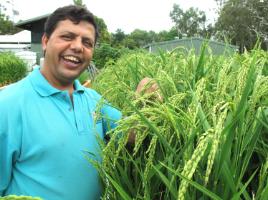Proponents of flooded rice fields face a dry argument
Published on 28 March, 2013
Rice has been a controversial crop in Australia, as most farms rely on flooded fields which use large water allocations and produce climate-changing methane gases. However, proponents of flooded rice fields could face a dry argument if CQUniversity researcher Dr Surya Bhattarai has his way.
LINK also to Rice work if you can get it - CQUni extends research partnership
Surya has started trials to find the genotypes best suited to Australia's wet-dry climate cycle.
Rice growing takes only 100 days from seed to harvest and Surya believes certain types can get enough soil moisture through rainfall during the wet months to sustain them to harvest, even if there are several weeks without any rain.
Surya is investigating rice genes controlling highly elastic physiology, helping to adapt rice genotypes to fluctuating soil moisture regimes (wet and dry cycles) experienced in the field during the wet season.
"Some varieties in the current test are showing a yield potential up to 8 ton/ha, which should be very attractive to spin off the industry based on upland rice cropping in central and northern Queensland," he says.
"Growing rice in the wet season not only produces environmentally friendly rice and contributes to new industry but also potentially minimizes the runoff and deep drainage from the paddocks with insufficient cover during the wet season; hence there are more positive outcomes for the reef health if the industry is developed in the watershed of the Great Barrier Reef."
Surya is based at the Centre for Plant and Water Science within CQUniversity's Institute for Resource Industries and Sustainability (IRIS).


